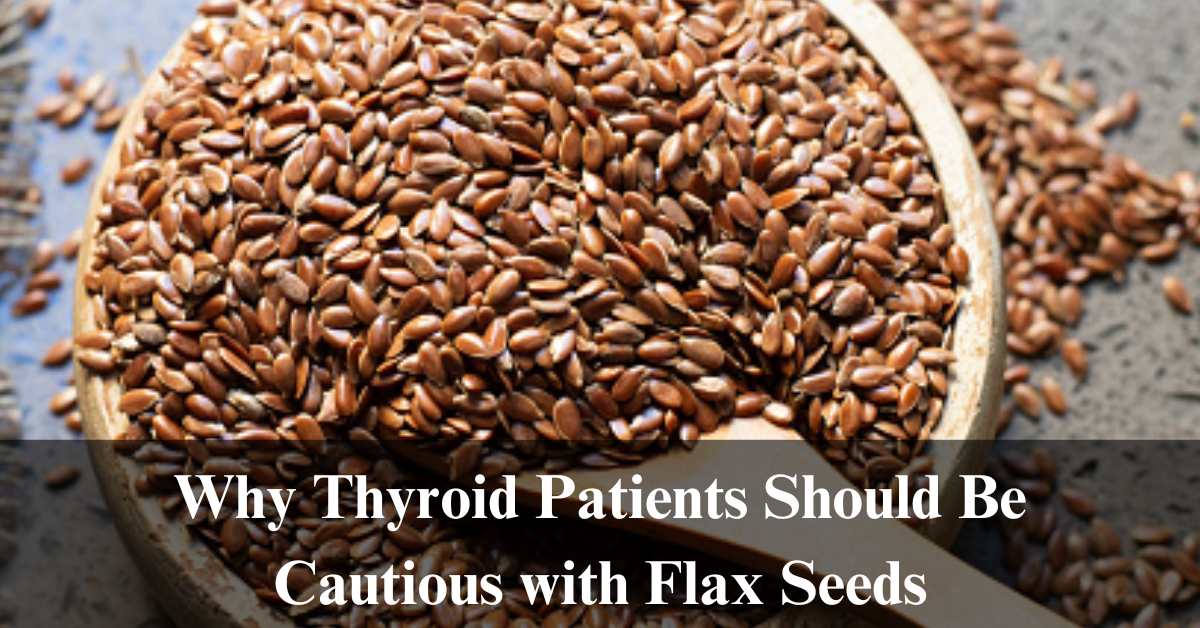Flax seeds are often celebrated for their numerous health benefits, including high fiber content, omega-3 fatty acids, and rich lignan content.
However, for individuals with thyroid issues, consuming flax seeds may present certain challenges.
You must be wondering why?
Thyroid and Its Functions
The thyroid is a butterfly-shaped gland located in the neck. It plays a critical role in regulating metabolism, energy production, and overall hormonal balance. Key hormones produced by the thyroid include thyroxine (T4) and triiodothyronine (T3), which are essential for numerous bodily functions.
Related-10 Best Ayurvedic Home Remedies To Cure/ Balance Thyroid Naturally
Potential Concerns with Flax Seeds for Thyroid Patients
@theSwasth.com
Goitrogenic Properties
One of the primary concerns for thyroid patients is the presence of goitrogens in flax seeds. Goitrogens are substances that can interfere with the uptake of iodine by the thyroid gland, an essential element needed for the production of thyroid hormones. Insufficient iodine uptake can lead to the development of goiters and potentially exacerbate hypothyroidism, a condition characterized by low thyroid hormone levels.
How Goitrogens Work
Goitrogens can inhibit the function of the enzyme thyroid peroxidase, which is critical for the synthesis of thyroid hormones. This inhibition can lead to reduced hormone production and, over time, may contribute to the enlargement of the thyroid gland (goiter).
Fiber Content and Medication Absorption
Flax seeds are high in fiber, which is beneficial for digestion and overall health. However, for thyroid patients, especially those taking thyroid hormone replacement therapy, high fiber intake can interfere with the absorption of their medication.
Timing and Dosage
To avoid this interaction, it’s recommended that thyroid patients consume flax seeds at least a few hours before or after taking their medication. This timing helps ensure that the fiber in flax seeds does not inhibit the absorption of thyroid medication, which is crucial for maintaining proper thyroid hormone levels.
Lignans and Hormonal Balance
Flax seeds are the richest dietary source of lignans, which are phytoestrogens—plant compounds that mimic estrogen in the body. While lignans have various health benefits, including antioxidant properties and potential cancer-preventive effects, their estrogen-like activity can sometimes affect hormone balance.
Impact on Thyroid Hormones
The thyroid gland is sensitive to hormonal changes, and phytoestrogens can potentially influence the hormonal environment in the body. For individuals with thyroid issues, especially those with hormone-sensitive conditions, it is essential to monitor and possibly moderate the intake of foods rich in phytoestrogens.
Practical Recommendations for Thyroid Patients
Moderation is Key
While flax seeds offer numerous health benefits, moderation is essential for thyroid patients. Consuming flax seeds in moderate amounts is less likely to cause significant issues related to goitrogens or fiber interference.
Alternatives to Flax Seeds
If there are concerns about flax seeds, other sources of omega-3 fatty acids and fiber can be considered:
Chia Seeds: Similar to flax seeds in nutrient profile but with lower goitrogenic potential.
Hemp Seeds: Rich in omega-3s and fiber without significant goitrogenic effects.
Walnuts: A good source of omega-3s that can be easily incorporated into the diet.
Related- Chia Seeds vs Flax Seeds: which is healthier and how to use them daily
Conclusion
While flax seeds are a nutrient-dense food with many health benefits, thyroid patients need to be cautious due to their goitrogenic properties, high fiber content, and phytoestrogen activity. By consuming flax seeds in moderation and choosing alternatives to flax seeds, thyroid patients can better manage their condition and maintain overall health.
- 9 Natural Ways to Balance Your Hormones
- The Connection Between Acne and Hormonal Imbalance in Females
- Why You Get Sleepy When You Meditate, Plus 9 Tips to Perk Up
- Symptoms of Heart Attacks in Women
- The Link Between Vitamin D and Hormones

